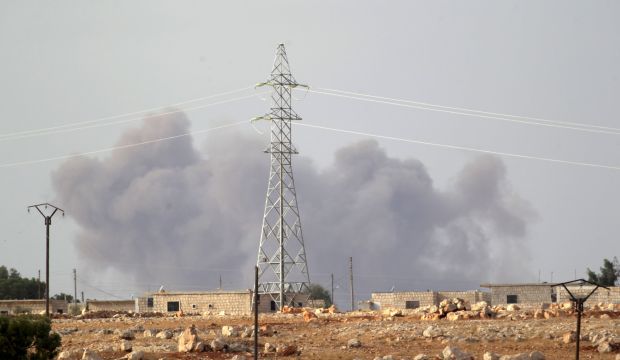
Smoke rises after what activists said were Russian airstrikes in the southern countryside of Idlib, Syria, on October 2, 2015. (REUTERS/Khalil Ashawi)
At a White House news conference, Obama frequently assailed Russian President Vladimir Putin, whom he accused of acting out of a position of weakness to defend a crumbling, authoritarian ally.
Putin’s decision to launch strikes on Syria marks a dramatic escalation of foreign involvement in a more than four-year-old civil war in which every major country in the region has a stake.
But the US president warned that Russia and Iran, Assad’s main backer in the Muslim world, have isolated the majority of Syrians and angered their Sunni Muslim neighbors.
“An attempt by Russia and Iran to prop up Assad and try to pacify the population is just going to get them stuck in a quagmire and it won’t work,” Obama said.
Russia bombed Syria for a third day in a row on Friday, mainly hitting areas held by rival insurgent groups rather than the Islamic State of Iraq and Syria (ISIS) fighters it said it was targeting and drawing an increasingly angry response from the West.
The US-led coalition that is waging its own air war against ISIS called on the Russians to halt strikes on targets other than ISIS.
Washington and its Western and regional allies say Russia is using it as a pretext to bomb other groups that oppose Assad.
Some of these groups have received training and weapons from Assad’s foreign enemies, including the US.
Moscow said on Friday its latest strikes had hit 12 ISIS targets, but most of the areas it described were in western and northern parts of the country, while ISIS is mostly present in the east.
The Russian Defense Ministry said its Sukhoi-34, Sukhoi-24M and Sukhoi-25 warplanes had flown 18 sorties hitting targets that included a command post and a communications center in the province of Aleppo, a militant field camp in Idlib and a command post in Hama.
A Defense Ministry official, Igor Konashenkov, later told Russian news agencies the Air Force had conducted 14 flights in Syria on Friday and made six strikes against ISIS targets. The ministry was not immediately available to comment on the apparent discrepancy with the earlier figures.
Targeting Russian bases
Meanwhile, Syria’s political and military opposition groups held a series of meetings on Friday to discuss ways to respond to Russia’s military action which they say is focused on civilian areas controlled by the Free Syrian Army (FSA), a moderate rebel group formed by army defectors.
Earlier this week, Khaled Khoja, the leader of the Western-backed Syrian National Coalition, described the Russian military presence in Syria as “occupation forces” given that most of the areas they have so far targeted are not controlled by ISIS but by moderate rebels.
Khoja called on the international community to “protect civilians through the establishment of safe zones.”
Some 73 armed rebel factions who back the Coalition will issue a statement within hours confirming that “only Syrians can fight ISIS and other terrorist groups but not before the departure of Assad and his clique,” a member of the FSA’s Military Council who goes by the nom de guerre Abu Ahmed Al-Asimi told Asharq Al-Awsat.
The military official said the opposition will consider all possible options, including “entering areas where Assad allies are present… so as to make them hard to target by Russia.”
The rebel commander did not rule out “carrying out operations against Russian bases [in Syria].”
